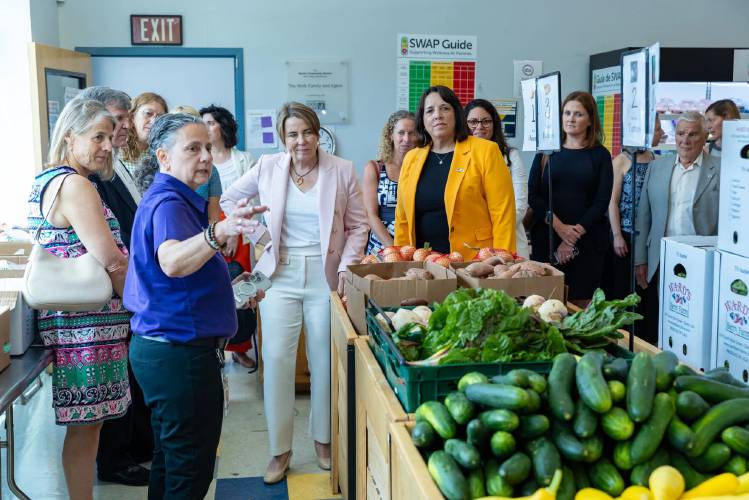Gov. Healey forms Anti-Hunger Task Force in response to federal SNAP cuts

Gov. Maura Healey and Lt. Gov. Kim Driscoll visited the Mystic Community Market in Medford on July 17, where they launched the Anti-Hunger Task Force. JOSHUA QUALLS/GOVERNOR’S PRESS OFFICE
|
Published: 07-25-2025 4:16 PM
Modified: 07-27-2025 6:53 PM |
With thousands of Massachusetts residents expected to lose access to food assistance benefits under the federal megalaw, Gov. Maura Healey has launched a task force to help the state navigate Supplemental Nutrition Assistance Program (SNAP) cuts.
Healey established the group through an executive order on July 17, bringing together Cabinet secretaries and agency leaders (or their designees), SNAP recipients, farmers and small business owners, plus leaders of food banks and nonprofits. The panel will also coordinate with existing food security initiatives, including Make Hunger History, which encompasses more than 300 organizations led by Project Bread, according to Healey’s office.
“President Trump’s cuts are going to force millions of people — children, seniors, veterans, people with disabilities — into hunger. They’re also going to hurt local farmers and retailers who rely on these programs to support their business and create jobs,” Healey said in a statement. “In Massachusetts, we won’t accept that.”
Included on the task force are several western Massachusetts voices, including Food Bank of Western Massachusetts Public Policy Manager Laura Sylvester, who said she looks forward to working with her fellow task force members to ensure assistance keeps coming to residents.
“Access to food is a human right, and too many people are already struggling to feed their families,” Sylvester said. “We’re looking forward to working together with our trusted anti-hunger advocate partners, along with leaders in Gov. Healey’s administration, to combat the harm our federal government is perpetrating with these cuts to SNAP and Medicaid. We’re excited to get to work leveraging every idea and dollar to make sure all Massachusetts residents have enough to eat.”
Massachusetts Department of Agricultural Resources Commissioner and Deerfield native Ashley Randle said the task force and state will need to “craft creative solutions to ensure that all Massachusetts residents have access to food from our local farms and fisheries.”
“Massachusetts has been a leader in connecting vulnerable families to fresh, healthy, local food through many innovative programs over the last several decades. Many of them were supported with federal funds, and several even served as models for national programs launched by federal agencies,” Randle said in a statement. “As the federal government reduces its commitment to these programs, we must ensure that farms and fisheries and the food they produce remain an essential part of building food security in the state.”
One in six Massachusetts residents receive benefits from SNAP. Under the “big beautiful bill” that President Donald Trump signed into law this month, 175,000 SNAP recipients — including legally present immigrants — could lose some or all of their benefits, according to the Massachusetts Law Reform Institute (MLRI).
Article continues after...
Yesterday's Most Read Articles
 Meeting physician retention goals: Two Greenfield Family Medicine Residency grads stay local
Meeting physician retention goals: Two Greenfield Family Medicine Residency grads stay local
 Police discuss status of investigation into Greenfield ATM theft
Police discuss status of investigation into Greenfield ATM theft
 Amherst, Mount Holyoke and Smith colleges named in early admissions suit
Amherst, Mount Holyoke and Smith colleges named in early admissions suit
 Greenfield School Committee reviews pay rates amid staffing troubles
Greenfield School Committee reviews pay rates amid staffing troubles
 Signatures turned in for Hope Street lot ballot initiative in Greenfield
Signatures turned in for Hope Street lot ballot initiative in Greenfield
 Franklin Tech picks preferred design for new school building
Franklin Tech picks preferred design for new school building
Among a string of policy changes, the MLRI stated that Massachusetts will need to adjust to a new cost-sharing structure, in which states will be responsible for 75% of SNAP administrative costs, compared to the prior 50% level. Healey has estimated that change alone could cost Massachusetts around $53 million annually.
Massachusetts could also be on the hook to cover $396 million annually starting in October 2027, depending on the state’s payment error rate, according to the MLRI.
“These federal changes will rip food assistance away from thousands of older adults, working families and immigrant communities, forcing them to choose between rent and groceries while dumping up to $400 million in costs onto our state and our taxpayers,” Department of Transitional Assistance Commissioner Jeff McCue said. “Gov. Healey’s Anti-Hunger Task Force represents the bold, compassionate leadership Massachusetts residents deserve, bringing together everyone from state agencies to local farmers to build real solutions when the federal government has failed them.”
The task force is charged with making recommendations “for mitigating the direct and indirect impacts of federal SNAP cuts and program changes to Massachusetts,” according to Healey’s order. The panel will also work to strengthen collaboration across the public, private and nonprofit sectors; explore collaboration or partnership opportunities across northeastern states; and recommend long-term strategies to alleviate hunger and food insecurity.
The task force’s first meeting has not been scheduled yet, according to a Healey spokesperson.
Greenfield Recorder reporter Chris Larabee contributed to this article.






 South County Notebook: Aug 17, 2025
South County Notebook: Aug 17, 2025 Mohawk Trail students to see new staff, new codes of conduct upon Aug. 27 return to school
Mohawk Trail students to see new staff, new codes of conduct upon Aug. 27 return to school Grand opening of Buckland-Shelburne Elementary School playground set for Aug. 26
Grand opening of Buckland-Shelburne Elementary School playground set for Aug. 26 Bear-y unwelcome: Why MassWildlife says it’s time to ‘break up’ with bird feeders
Bear-y unwelcome: Why MassWildlife says it’s time to ‘break up’ with bird feeders
